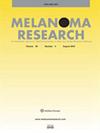Exploring the role of epigenetic alterations and non-coding RNAs in melanoma pathogenesis and therapeutic strategies.
IF 1.5
4区 医学
Q3 DERMATOLOGY
引用次数: 0
Abstract
Melanoma is a rare but highly lethal type of skin cancer whose incidence is increasing globally. Melanoma is characterized by high resistance to therapy and relapse. Despite significant advances in the treatment of metastatic melanoma, many patients experience progression due to resistance mechanisms. Epigenetic changes, including alterations in chromatin remodeling, DNA methylation, histone modifications, and non-coding RNA rearrangements, contribute to neoplastic transformation, metastasis, and drug resistance in melanoma. This review summarizes current research on epigenetic mechanisms in melanoma and their therapeutic potential. Specifically, we discuss the role of histone acetylation and methylation in gene expression regulation and melanoma pathobiology, as well as the promising results of HDAC inhibitors and DNMT inhibitors in clinical trials. We also examine the dysregulation of non-coding RNA, particularly miRNAs, and their potential as targets for melanoma therapy. Finally, we highlight the challenges of epigenetic therapies, such as the complexity of epigenetic mechanisms combined with immunotherapies and the need for combination therapies to overcome drug resistance. In conclusion, epigenetic changes may be reversible, and the use of combination therapy between traditional therapies and epigenetically targeted drugs could be a viable solution to reverse the increasing number of patients who develop treatment resistance or even prevent it. While several clinical trials are underway, the complexity of these mechanisms presents a significant challenge to the development of effective therapies. Further research is needed to fully understand the role of epigenetic mechanisms in melanoma and to develop more effective and targeted therapies.探讨表观遗传学改变和非编码RNA在黑色素瘤发病机制和治疗策略中的作用。
黑色素瘤是一种罕见但高度致命的皮肤癌症,其发病率在全球范围内不断上升。黑色素瘤的特点是对治疗的高抵抗力和复发。尽管转移性黑色素瘤的治疗取得了重大进展,但许多患者由于耐药机制而出现进展。表观遗传学变化,包括染色质重塑、DNA甲基化、组蛋白修饰和非编码RNA重排的改变,有助于黑色素瘤的肿瘤转化、转移和耐药性。本文综述了黑色素瘤表观遗传学机制及其治疗潜力的研究进展。具体而言,我们讨论了组蛋白乙酰化和甲基化在基因表达调控和黑色素瘤病理生物学中的作用,以及HDAC抑制剂和DNMT抑制剂在临床试验中的有希望的结果。我们还研究了非编码RNA,特别是miRNA的失调,以及它们作为黑色素瘤治疗靶点的潜力。最后,我们强调了表观遗传学疗法的挑战,例如表观遗传学机制与免疫疗法相结合的复杂性,以及需要联合疗法来克服耐药性。总之,表观遗传学变化可能是可逆的,在传统疗法和表观遗传学靶向药物之间使用联合疗法可能是一个可行的解决方案,可以逆转越来越多的患者出现治疗耐药性,甚至预防耐药性。虽然几项临床试验正在进行中,这些机制的复杂性对开发有效的治疗方法提出了重大挑战。需要进一步的研究来充分了解表观遗传学机制在黑色素瘤中的作用,并开发更有效和更有针对性的治疗方法。
本文章由计算机程序翻译,如有差异,请以英文原文为准。
求助全文
约1分钟内获得全文
求助全文
来源期刊

Melanoma Research
医学-皮肤病学
CiteScore
3.40
自引率
4.50%
发文量
139
审稿时长
6-12 weeks
期刊介绍:
Melanoma Research is a well established international forum for the dissemination of new findings relating to melanoma. The aim of the Journal is to promote the level of informational exchange between those engaged in the field. Melanoma Research aims to encourage an informed and balanced view of experimental and clinical research and extend and stimulate communication and exchange of knowledge between investigators with differing areas of expertise. This will foster the development of translational research. The reporting of new clinical results and the effect and toxicity of new therapeutic agents and immunotherapy will be given emphasis by rapid publication of Short Communications. Thus, Melanoma Research seeks to present a coherent and up-to-date account of all aspects of investigations pertinent to melanoma. Consequently the scope of the Journal is broad, embracing the entire range of studies from fundamental and applied research in such subject areas as genetics, molecular biology, biochemistry, cell biology, photobiology, pathology, immunology, and advances in clinical oncology influencing the prevention, diagnosis and treatment of melanoma.
 求助内容:
求助内容: 应助结果提醒方式:
应助结果提醒方式:


